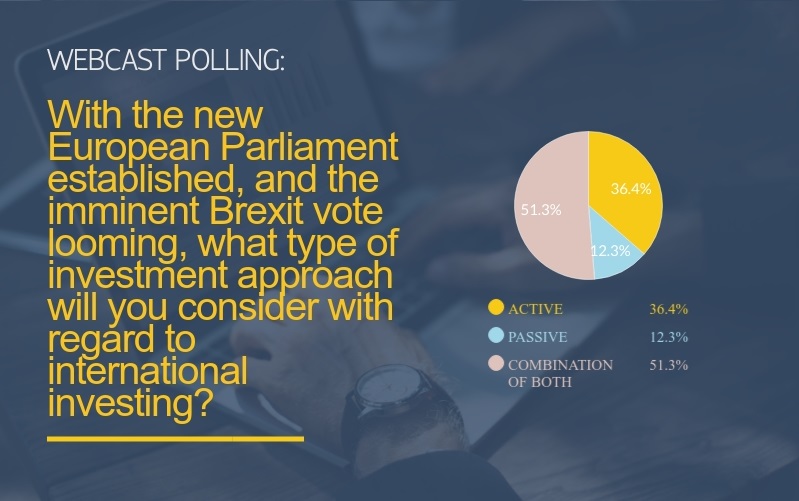Investors who are looking to international market exposure should also consider about how shifts in geopolitical currents can present opportunities that a targeted exchange traded fund approach can potentially capitalize on.
On the recent webcast, Geopolitical Impact Creates Investment Opportunities, John Sitilides, Geopolitical Strategist at Trilogy Advisors, and Salvatore Bruno, Chief Investment Officer and Managing Director at IndexIQ, will outline how current geopolitical developments might influence the structure of short- and long-term investments and consider how foreign markets may also provide opportunities along with risks.
The strategists argued that markets face a new international framework, shaped by increased geopolitical risks. For instance, investors are now confronted by powerful drivers of today’s global turmoil, including strategically targeted global challenges from China, Europe’s internal governing crises, EU’s enduring uncertainties, and growing regional and global threats, particularly from Iran
Due to the various circumstances, we are witnessing a reordering in the decision-making of the world’s most influential political leaders. Consequently, the strategists anticipated an end to the stable post-Cold War era of a free and open rules-based international trading order; the application of increasingly malignant political, economic, and military power; and the need to brace for the era of global geopolitical volatility, with national politics and regional stability “on the edge”.
Despite the risks, the international market is too big to ignore. International equities represent roughly 46% of the world’s market capitalization, but the average U.S. fund investor only has about 23% allocated to foreign markets. This under allocation has left a lot of potential gains on the table for many investors as international equities have outpaced U.S. equities for significant stretches. Furthermore, international stocks are currently trading at a discount to both their historical average and to U.S. equities, hovering around valuations at 20-year lows relative to U.S. markets.

To better help investors gain targeted exposure to these international opportunities, IndexIQ outlined several strategies to better build an international position. For example, investors can look to a currency hedged strategy for short-term currency fluctuations or a volatility-managed approach over the long-term. A smart Beta strategy uses multiple factors with the goal of identifying “winners” rather than passively tracking an index like the MSCI EAFE. Lastly, a global Merger Arbitrage strategy can benefit from deal spread on globally announced deals, which historically have shown low volatility until the deal is completed and historically low correlations to the broader markets.
When investing abroad, foreign exchange currency risks is one of the major hurdles. Currency valuations tended to revert to the mean over long periods of time, but fluctuated dramatically during shorter periods—increasing the impact of currency movements.
ETF investors interested in foreign market exposure but are also taking a more neutral view on foreign currency movements can consider a handful of 50% hedged/50% unhedged options, including the IQ 50 Percent Hedged FTSE International ETF (NYSEArca: HFXI), IQ 50 Percent Hedged FTSE Europe ETF (NYSEArca: HFXE) and IQ 50 Percent Hedged FTSE Japan ETF (NYS Arca: HFXJ). All three funds have approximately half their currency exposure of the securities in the underlying index hedged against the U.S. dollar on a monthly basis. A 50% hedge helped reduce volatility – a 50% hedge provided much of the long-term risk reduction of a 100% hedged portfolio.
Smart beta or selecting and weighting securities in a rules-based process helps identify preeminent companies across sectors and geographies and can serve as an efficient core International exposure in a portfolio.

For example, the IQ 500 International ETF (NYSEArca: IQIN) tries to reflect the performance of the IQ 500 International Index. All index components are headquartered outside the U.S. and are made up of common stock. The potential universe of constituent equities is ranked and weighted according to three fundamental factors; Sales, Market Share and Operating Margin. The ETF takes a different approach, looking at key fundamental factors and weighting the portfolio based on key metrics of relative strength and market position.
Lastly, Merger Arbitrage can deliver consistent returns unphased by both equity and bond stress. A merger arbitrage investment strategy may help investors garner more consistent returns and possibly deliver a smoother ride, serving as an important capital preservation tool and providing drawdown protection in times of volatile market conditions.
The Index IQ Merger Arbitrage ETF (NYSEArca: MNA) provides investors with a diversified approach to a group of takeover targets. The ETF employs a type of alternative, “directional hedge fund strategy” called merger arbitrage. The fund would capture the spread or difference between a stock’s trading price before a deal is announced and its eventual takeover price.
Financial advisors who are interested in learning more about global markets can catch the webcast here on demand.
